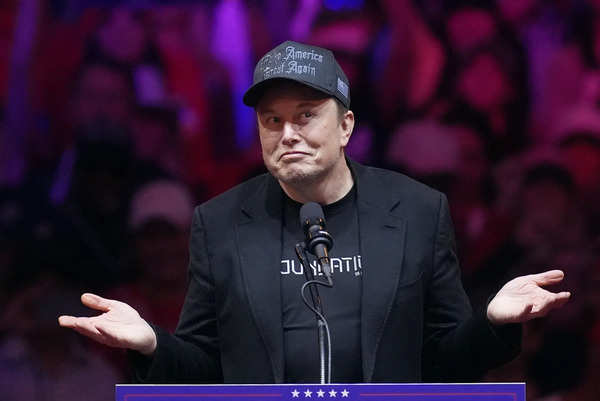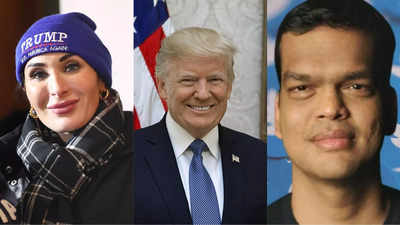The appointment of Sriram Krishnan as the White House’s senior policy adviser for artificial intelligence has sparked heated debate among political factions, particularly among Trump’s Make America Great Again (MAGA) supporters. . The uproar combines criticism of Mr. Krishnan’s policies, broad immigration reform and an alleged betrayal of conservative ideals, highlighting the tension between nationalism and pragmatism in a globalized economy. . This article explores the key issues fueling the controversy.
President Trump makes surprising appointment of Sriram Krishnan
In a move that surprised many, former President Donald Trump appointed technology entrepreneur Sriram Krishnan as his special envoy to advance U.S. policy on artificial intelligence (AI). Mr. Krishnan comes from a prominent Silicon Valley background with extensive experience at major technology companies, and some saw it as a strategic decision to strengthen U.S. leadership in AI.
However, the appointment soon became a flashpoint of controversy. Far-right critics, especially those aligned with MAGA ideology, viewed Krishnan as a symbol of Silicon Valley elitism and a proponent of immigration policies that they say disadvantage American workers. Trump, long associated with hard-line stances on immigration, faced accusations of hypocrisy for aligning himself with a figure seen as representing globalist ideals.
Supports removal of green card country cap
Mr. Krishnan’s advocacy for immigration reform, particularly his support for lifting country caps on green cards, further fueled the backlash. The current U.S. immigration system allocates green cards equally to all countries, regardless of the number of applicants. The policy has had a major impact on applicants in India, who face an average waiting time of 11 years due to high demand. On the other hand, applicants from countries with fewer applicants experience little or no delays.
Krishnan, along with tech industry leaders such as David Sachs and Elon Musk, argue that removing these caps is a necessary step to ensure a fair and merit-based system. . Sachs said Krishnan’s position is not to advocate eliminating all green card caps, but rather to address inefficiencies that disadvantage highly skilled immigrants from India. He made it clear that he was claiming that. “Sriram supports skills-based criteria for receiving green cards, rather than making the program open-ended,” Sachs emphasized.
MAGA backlash and accusations of betrayal
The backlash from MAGA supporters has been fierce and scathing. Far-right commentator Laura Loomer criticized Krishnan’s appointment on X (formerly Twitter), labeling him a “career leftist” and saying he violated President Trump’s “America First” policy. denounced. Loomer’s criticism focused on the following points:
These criticisms resonated with some in Trump’s base who remain skeptical of immigration, especially highly skilled immigrants who compete with domestic talent.
Technology industry leaders rally behind Krishnan
Prominent technology figures quickly came to Krishnan’s defense. David Sachs and Elon Musk both posted to X to clarify and support Krishnan’s position. Musk, with characteristic brevity, signaled his approval of Krishnan’s proposal, commenting that it “makes sense.”
Sacks’ rebuttal was more detailed and highlighted the nuances of Krishnan’s position. He stressed that removing the country cap on green cards is not about opening the floodgates, but rather redressing systemic inequalities. Sachs argued that these reforms will help the United States retain its world-class talent and remain competitive in key areas such as AI and technology. Congressman Ro Khanna also joined in praising Mr. Krishnan for his expertise and contribution to fostering innovation in the United States. Mr. Khanna’s defense has portrayed Mr. Krishnan as a patriot committed to strengthening the U.S. economy and securing leadership in cutting-edge industries.
The role of racism in backlash
While policy disagreements are a natural part of political debate, much of the criticism leveled at Krishnan has overtly racist undertones. Far-right commentators have questioned his loyalty to the United States based on his Indian heritage and immigrant background. This rhetoric reflects a broader xenophobic narrative within certain MAGA circles that portrays immigrants as a threat to American identity and economic security.
Technology leaders and progressive commentators have denounced these attacks as baseless and harmful. They argue that such rhetoric undermines the contributions of immigrants, who play a vital role in driving innovation and economic growth in the United States.
Debate over H-1B visas and economic competitiveness

The controversy surrounding Mr. Krishnan’s appointment has also brought new attention to the H-1B visa program, which allows U.S. companies to hire highly skilled foreign workers. Critics say the program is often misused to lay off American workers and suppress wages. But supporters believe it is essential to attracting top global talent, especially in STEM fields.
Mr. Krishnan’s position is consistent with the latter perspective. He will address the challenges faced by skilled immigrants, particularly those from India, who face long wait times for green cards under the current system by advocating for reforms that prioritize merit and efficiency. I’m aiming for it.
Highly skilled immigrants: America’s competitive edge
Highly skilled immigrants have helped make America the greatest country in the world, especially in fields such as technology, health care, and engineering. These people bring the expertise, innovation, and entrepreneurial spirit that has propelled the U.S. economy to unparalleled heights. Silicon Valley’s workforce is largely made up of immigrants, many of whom are founders of startups that have grown into global giants. Companies like Google, Microsoft, and Tesla owe much of their success to immigrant talent.
Beyond entrepreneurship, highly skilled immigrants are essential if the United States is to stay ahead of global competitors like China. As China invests heavily in AI, quantum computing, and biotechnology, the United States must continue to attract and retain top talent to maintain its technological edge. Mr. Krishnan’s appointment and advocacy for immigration reform reflect an understanding of this strategic imperative.
Competition with China is not just economic, but also ideological. By fostering an environment that rewards talent and innovation, the United States is strengthening its commitment to the values of opportunity and meritocracy. Highly skilled immigrants are on the front lines of this fight, contributing to the development of cutting-edge technologies that strengthen national security and economic growth.
But systemic inefficiencies in the U.S. immigration system threaten to undermine this competitiveness. For example, skilled workers in India often have to wait as long as 10 years to obtain a green card, leaving them to consider opportunities in countries like Canada and Australia, which offer a more streamlined path to permanent residency. There are many people. These policy reforms are critical to ensuring that the United States remains the destination of choice for the world’s brightest people.
Tech Brothers’ Counterattack

Elon Musk
Silicon Valley’s response was positive and unapologetic. Figures like Jason Kalakanis and Sriram Krishnan himself have pushed back against MAGA’s claims, highlighting the economic contribution of highly skilled immigrants. Mr. Karakanis’ post on X argued that policies like the one supported by Mr. Krishnan are essential to keeping America competitive in a rapidly evolving global economy.
Technology industry leaders also highlighted the irony of MAGA’s opposition to Krishnan. They argue that fostering innovation and attracting top talent is central to President Trump’s broader vision to “Make America Great Again.” MAGA opponents, they argue, are hurting America’s growth potential by resisting reforms that address inefficiencies in the immigration system.
The crossroads of immigration and innovation
The uproar over Sriram Krishnan’s appointment and his policy positions reflects the depth of tensions within American politics. On the other hand, immigration policies need to adapt to a globalized economy that rewards innovation and talent. On the other hand, there are segments of the population that resist change out of fear of cultural and economic ostracism.
Mr. Krishnan’s proposal represents an attempt to strike a balance between merit-based immigration and institutional fairness, including eliminating country-specific caps on green cards. It remains to be seen whether these reforms will gain traction. But this debate underscores the importance of developing policies that reflect America’s values of opportunity and inclusion while addressing the practical challenges of a competitive global landscape.
As the debate unfolds, the role of leaders like Krishnan will be critical in shaping the future of U.S. immigration policy and ensuring this country remains a beacon of talent and innovation around the world. It will be.



